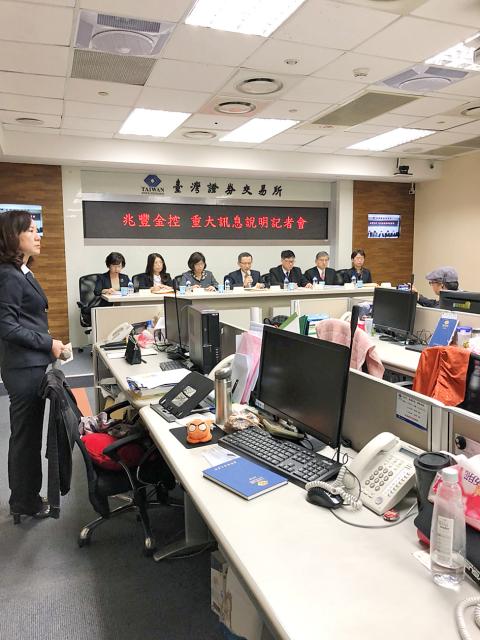State-run Mega International Commercial Bank (兆豐銀行) yesterday said it has agreed to pay a US$29 million fine to US federal financial regulators for compliance failures at three US branches.
The banking arm of Mega Financial Holding Co (兆豐金控) attributed the latest penalty to previous breaches of US money laundering and banking secrecy laws, for which it had already paid a fine of US$180 million in 2016 to the New York State Department of Financial Services.
Those deficiencies prompted the US Federal Reserve Board to conduct inspections of Mega Bank’s branches in New York, Illinois and California, and hand down the new fine, Mega Bank president Bruce Yang (楊豊彥) told a news conference at the Taiwan Stock Exchange.

Photo: CNA
US federal authorities also required the bank to come up with measures to strengthen its money laundering oversight and controls, Yang said.
“The new fine stemmed from old breaches,” which had triggered a reshuffle of top executives and eroded much of the lender’s earnings in 2016, he said.
Mega Financial reported NT$26.62 billion (US$900.5 million) in net income for last year, or earnings per share of NT$1.96, despite higher provision and compliance costs, a bank official said by telephone.
The results suggest a double-digit percentage increase from NT$22.39 billion in profit recorded in 2016, although the final figures would soften after recognition of the new fine, which amounts to NT$857.29 million, said the official, who asked not to be named.
Mega Financial aims to book the new fines on last year’s earnings, the official said, adding: “Despite the bad news, the company managed to meet its earnings target last year.”
Mega Financial has been introducing corrective measures and upgrading its computer system, but it might take a while to get everything back on track in light of the complexity involved, Yang said.
Mega Financial denied any involvement in money laundering and apologized for its loose internal controls causing a stir in Taiwan and the US.
The bank-focused conglomerate turned conservative on lending operations following the 2016 fine, setting a mild increase of 1.5 percent to 2 percent in its loan books last year, and halting a search for acquisition opportunities at home and abroad.
The Financial Supervisory Commission said it would conduct an examination of three Mega Bank branches in the US and might issue more fines to the lender, after it slapped it with a fine of NT$10 million on Sept. 4, 2016.
The commission said it would wait and see how the US responds to Mega Bank’s progress in improving the issue before deciding whether and how much to fine the bank again.
The Executive Yuan said the US$29 million fine would not affect the Asia/Pacific Group on Money Laundering’s evaluation of Taiwan this year, which is a key indicator of the nation’s efforts to prevent money laundering in line with international standards.
Cabinet spokesman Hsu Kuo-yung (徐國勇) said the US federal system allows both federal and local governments to issue separate punishments for the same violation.
Additional reporting by Chen Wei-han and CNA

INVESTIGATION: The case is the latest instance of a DPP figure being implicated in an espionage network accused of allegedly leaking information to Chinese intelligence Democratic Progressive Party (DPP) member Ho Jen-chieh (何仁傑) was detained and held incommunicado yesterday on suspicion of spying for China during his tenure as assistant to then-minister of foreign affairs Joseph Wu (吳釗燮). The Taipei District Prosecutors’ Office said Ho was implicated during its investigation into alleged spying activities by former Presidential Office consultant Wu Shang-yu (吳尚雨). Prosecutors said there is reason to believe Ho breached the National Security Act (國家安全法) by leaking classified Ministry of Foreign Affairs information to Chinese intelligence. Following interrogation, prosecutors petitioned the Taipei District Court to detain Ho, citing concerns over potential collusion or tampering of evidence. The

‘FORM OF PROTEST’: The German Institute Taipei said it was ‘shocked’ to see Nazi symbolism used in connection with political aims as it condemned the incident Sung Chien-liang (宋建樑), who led efforts to recall Democratic Progressive Party (DPP) Legislator Lee Kun-cheng (李坤城), was released on bail of NT$80,000 yesterday amid an outcry over a Nazi armband he wore to questioning the night before. Sung arrived at the New Taipei City District Prosecutors’ Office for questioning in a recall petition forgery case on Tuesday night wearing a red armband bearing a swastika, carrying a copy of Adolf Hitler’s Mein Kampf and giving a Nazi salute. Sung left the building at 1:15am without the armband and apparently covering the book with a coat. This is a serious international scandal and Chinese

Seventy percent of middle and elementary schools now conduct English classes entirely in English, the Ministry of Education said, as it encourages schools nationwide to adopt this practice Minister of Education (MOE) Cheng Ying-yao (鄭英耀) is scheduled to present a report on the government’s bilingual education policy to the Legislative Yuan’s Education and Culture Committee today. The report would outline strategies aimed at expanding access to education, reducing regional disparities and improving talent cultivation. Implementation of bilingual education policies has varied across local governments, occasionally drawing public criticism. For example, some schools have required teachers of non-English subjects to pass English proficiency

TRADE: The premier pledged safeguards on ‘Made in Taiwan’ labeling, anti-dumping measures and stricter export controls to strengthen its position in trade talks Products labeled “made in Taiwan” must be genuinely made in Taiwan, Premier Cho Jung-tai (卓榮泰) said yesterday, vowing to enforce strict safeguards against “origin laundering” and initiate anti-dumping investigations to prevent China dumping its products in Taiwan. Cho made the remarks in a discussion session with representatives from industries in Kaohsiung. In response to the US government’s recent announcement of “reciprocal” tariffs on its trading partners, President William Lai (賴清德) and Cho last week began a series of consultations with industry leaders nationwide to gather feedback and address concerns. Taiwanese and US officials held a videoconference on Friday evening to discuss the